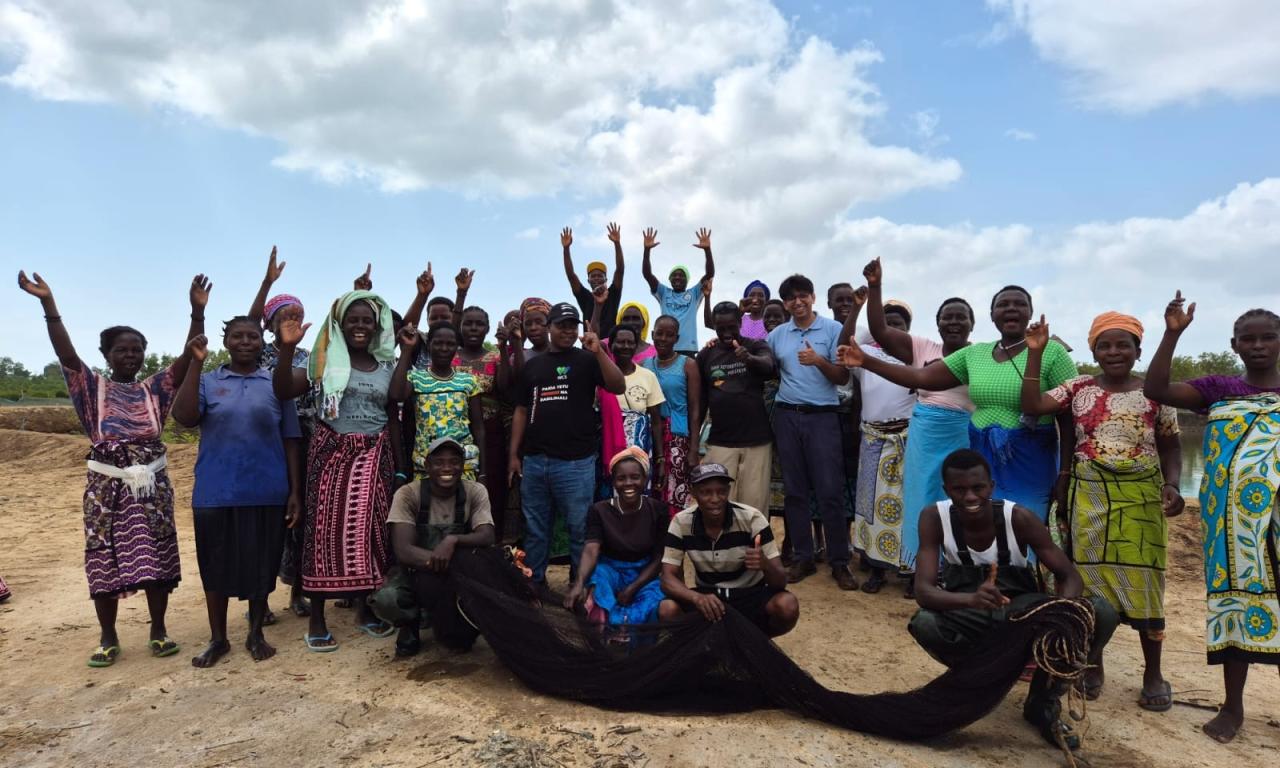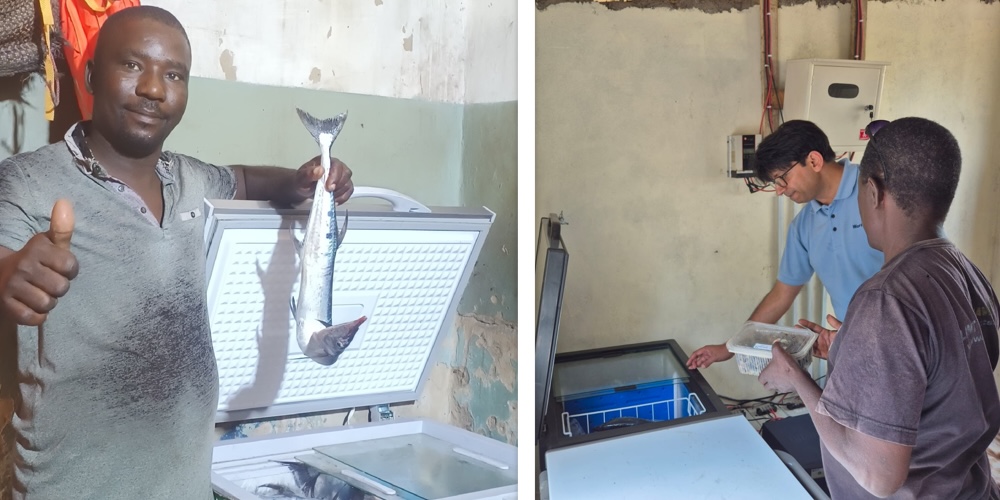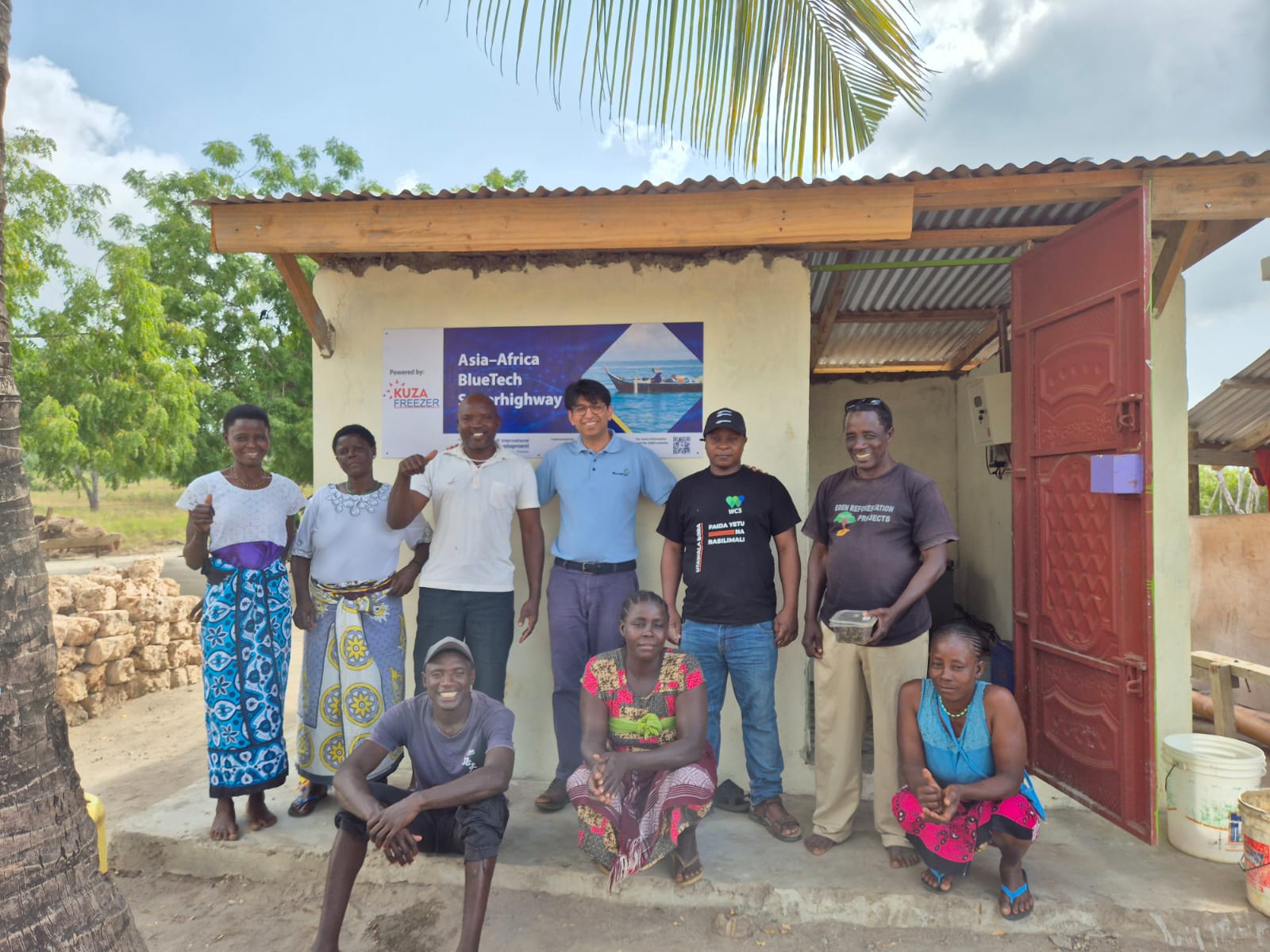
Christine Mbaru is a member of Umoja Self Help Group, a women-led organization that supports disadvantaged and off-grid rural fishing communities in Kilifi County, Kenya. Due to the highly perishable nature of fish and a lack of reliable cold storage solutions, Christine often deals with post-catch losses. Many days, her entire harvest is spoilt, and she throws away her day’s earnings. On other occasions, Christine uses expensive ice to preserve her catch or sun-dries her produce which fetches much less than fresh fish.
Mtwapa Beach Management Unit (BMU), an organized fisher community in Mtwapa, Kilifi County, is involved in fishing and value-added activities. Fishers from Mtwapa face similar challenges of post-harvest losses due to the lack of proper preservation facilities. Mbwana Asaa from Mtwapa confirmed how the lack of reliable cold storage and market access greatly affects his daily income.
Members of both these groups and local fisherfolks shared with the WorldFish Asia-Africa BlueTech Superhighway (AABS) Work Package 3 team how, without refrigeration, their catch which could be sold for approximately USD 5.00 per kilogram (kg), often had to be offloaded for just USD 2.80 per kg.
“Fisherfolk experience significant economic losses, reaching up to 45%, when they lack access to reliable cold storage. To prevent their catch from spoiling, they are often compelled to sell it at extremely low prices to other traders,” said Aditya Parmar, Postharvest Scientist at WorldFish.
There has been a perceived need for a sustainable solution to enable the Kilifi fishing communities to reduce losses, secure better prices, and contribute to a more resilient fish value chain. To bridge this gap, AABS partnered with Germany-based solar technology consulting firm Simply Solar GbR and local cold chain company Kuza Freezers to distribute solar-powered freezers. The aim was to reduce the fish loss between harvest and sale while training the communities on using the freezers effectively and understanding their financing options.
The AABS Intervention - Reliable Cold Storage, Training, and Sustainable Revenue Model
In December 2024, AABS installed four pay-as-you-go (Pay-G) solar freezers and panels in Umoja and eight units in Mtwapo BMU. The project had three focus areas – a) Reduce fish spoilage rates to help fisherfolk maximize their harvests; b) Increase income by providing access to broader markets with fresher products; c) Empower women-led groups, particularly the Umoja Self Help Group, by enhancing their financial independence.
The ‘AABS Evaluation and Impact Assessment Plan’ outlined a systematic approach to evaluate project activities and their long-term socioeconomic, environmental, and institutional impacts. The AABS team developed methodologies, procedures, and timelines for assessing the project's progress, measuring its effects, and implementing necessary adjustments to ensure it stays on track.
Training sessions were held for members of Umoja and Mtwapa on how to use and maintain solar freezers, navigate the Pay-G system, and understand safety protocols and preventive maintenance.
“The solar freezers are projected to significantly reduce fish spoilage, enabling fisherfolk to access higher-value markets while fostering sustainable income,” said Dennis Onkangi, Managing Director of Kuza Freezers.

Cool Innovation and Technology Improve Livelihoods
Constructed from locally available material, these low-cost and eco-friendly freezers operate on solar energy with a battery life of up to seven hours. The freezers are lined with icepacks as a backup to assure that the day’s catch is kept fresh and sellable even in the absence of power or limited sunlight. The design is tailored for energy efficiency and reliable operation over many years.
Kuza’s flexible Pay-G model allows fishers to rent the freezers with minimal upfront costs, incorporating mobile payment systems such as M-PESA. Further, by using IoT technology, it can remotely monitor product performance, improve service quality, and track customer payments.
“Fisherfolk have the option to pay daily or weekly for freezer use, making the technology financially accessible while addressing cold storage gaps. The IoT technology allows us to remotely monitor freezer locations and temperature controls, ensuring effective operation and support,” said Dennis.

Community Impact and Scalability
The solar freezers are owned by groups comprising two to three fisher-members. The collective ownership model empowers communities, increases accountability, and promotes sustainability by directing the shared revenue into a revolving fund. This fund is instrumental in financing additional freezers, gradually transferring ownership to user groups, and ensuring the scalability and sustainability of the project.
“This revenue model reduces dependence on subsidies and fosters long-term economic independence for fisher communities,” said Aditya.
After paying approximately USD 35 per month for about three years, the ownership is transferred to the group. Following the transfer of ownership, product maintenance is assured through affordable contracts and warranty periods for the freezer, solar panels, and batteries.
The next steps include further optimizing the solar-powered cold chain solutions at Umoja Self-Help Group. “From an in-country technical capacity-building point of view, WorldFish and Simply Solar plan to develop and launch locally produced solar direct drive - a technology where solar energy is stored in ice instead of in batteries. This will eliminate lithium-ion batteries and further reduce freezer costs,” Aditya explained.
